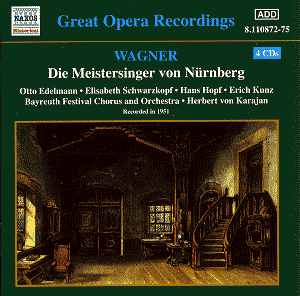This set caused controversy when it first appeared
on 78rpm on 68 sides!! - the longest set ever devoted to a single work.
It competed with the Decca Knappertsbusch set, and opinion was fairly
equally divided between the two as to which was preferable. The Decca
set appeared first on LP, and thus had a head start, but Karajan soon
made up the distance. The set was plagued with bad tape joins, and differences
in pitch between the various joins - disconcerting to say the least.
I have had the advantage of being able to compare the performance with
Kempe/EMI, Karajan/EMI, Sawallisch/EMI, and Kubelik/Calig (or Myto).
The nearest comparison is to Kempe, both in time and recording medium
(both mono), but a recommendation (very personal) with digital recording
is I think, valuable.
The first comparison between the two Karajan versions,
with a gap of 18 years, is the similarities and the almost identical
speeds! - in fact, the later version takes fully 9 seconds less, and
this despite Karajan’s reputation for lingering over the more romantic
lush passages. In fact, in both versions it is noticeable that his speeds
are brisk and keep the action moving; this is especially marked in the
polterabend scenes in Act 2. At the same time, the moving scenes between
Eva and Walther in the same act are not rushed. Neither is Pogner’s
address to the Masters in Act 1, which retains its nobility and praise
to the Johannesfest. Hans Hopf has an excellent heldentenor voice, and
Gerhard Unger, as ever, gives a wonderful rendition of David’s role
(how many times has he sung this? - at least five times are represented
in the current catalogue). I had not heard of Ira Malaniuk who sings
Magdalena before this performance, but she is a very sure and steady
mezzo-soprano who holds her lines well. The unsure one is unfortunately
Otto Edelmann as Hans Sachs, the central figure in the opera. It is
admitted that he had not sung the part before, but surely for someone
of his stature he should have been more certain than he sounds? There
are several weak entries and one rank bad one in the Wahnmonolog. He
also (and this is the greatest fault) fails to dominate the scene when
he appears. On the other hand, the chorus is good, and being placed
reasonably well forward, the diction is excellent, even surpassing more
recent recordings. The Masters as a group are only adequate, and then
probably greater than the sum of their parts; Pogner is suitably imposing
and Beckmesser notably waspish. I was surprised to hear Schwarzkopf
as Eva with a very noticeable vibrato (this affected Edelmann too) and
wondered whether this may have been engendered from the tape machine
used in the recording.
The sound has been cleaned up wonderfully by Mark Obert-Thorn;
the aforesaid tape joins are virtually indistinguishable (I heard one
in Act 3) and the pitch has been restored to its normal level. Except
for the odd glissando in the strings, and a very slight uncertainty
of pitch, one would never guess this was 1951. The booklet is of Naxos
standard, i.e. a brief synopsis and no words - not too important provided
one knows the broad outline of the story, which is given. I should point
out that this is taken from the rehearsal and performances of what is
a live performance; therefore one has varying bumps and bangs from the
stage, and a fair amount of coughing from the audience (at times this
seems almost obligatory).
So which should one choose? Of the two mono recordings,
my preference must stay with Kempe on EMI (763500-2). His Sachs is preferable
(Ferdinand Franz), Eva from Elisabeth Grummer is radiant, and he has
a very heroic Walther in Rudolf Schock (and Gerhard Unger as David!).
The Berlin Opera forces are far superior to Karajan’s Bayreuth performers,
and the recording is naturally richer and more full, being five years
later. Of the digital versions, Kubelik on Calig is outstanding in his
interpretation, allowing air and light through the score, and he has
an unforgettable Eva in Gundula Janowitz (CAL50971/4). Thomas Stewart
makes a noble if somewhat lightweight Sachs, and Thomas Hemsley is excellent
as Beckmesser. And who do you think is David? - Gerhard Unger again,
still sounding youthful 16 years later.
As with most long works, there is no ideal version,
and a lot depends on individual preference. I would not like to be without
any of the above and as an introduction, this Naxos disc at £20 cannot
be sneered at
John Portwood

